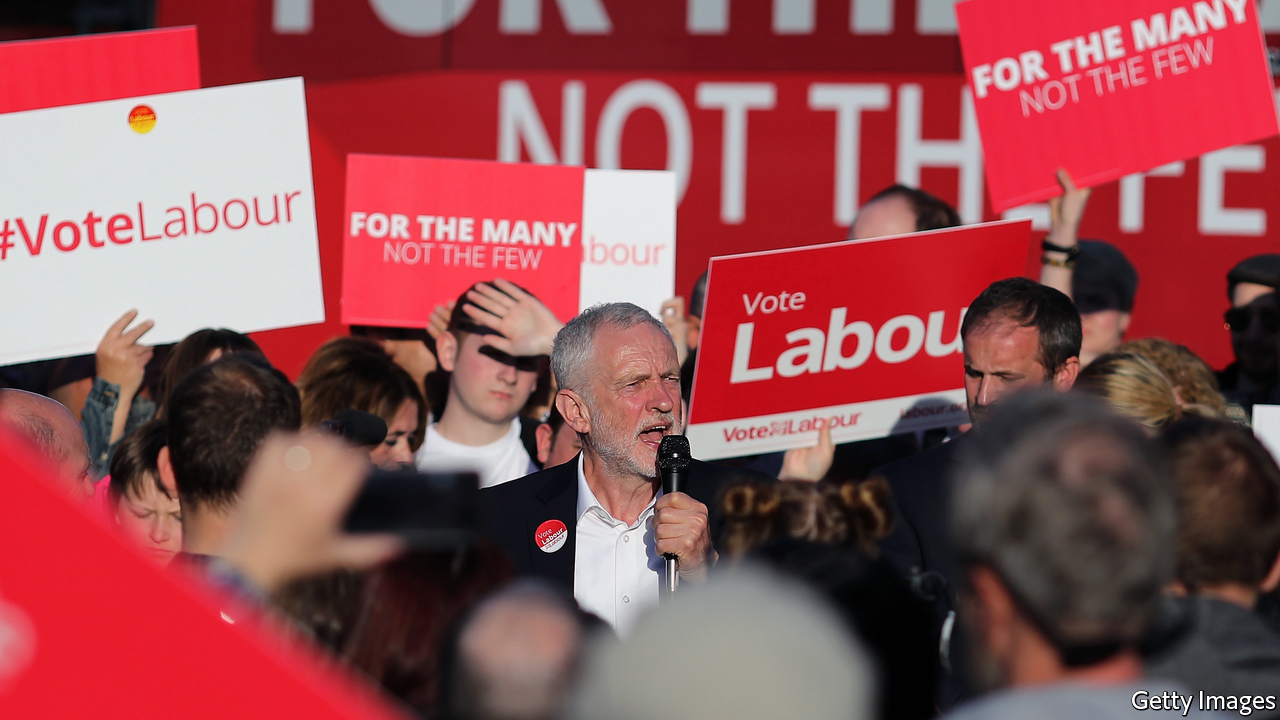BRITISH election campaigns are usually carefully choreographed affairs. They are short and sharp: just a few weeks of formal campaigning compared with America’s year or so. And they are divided into two parts: before and after the publication of the party manifestos. Before the publication politicians fend off pesky interviewers by saying, “You’ll have to wait until we publish the manifestos.” After the publication they fend off pesky interviewers by saying, “It’s all spelt out in detail in the manifesto.”
The campaign this year has certainly conformed to the first part of the dance. By calling a snap election against most people’s expectations Theresa May crammed everything into just six weeks—not just the campaigning itself but also the selection of candidates. Late on May 10th the second part of the dance turned into chaos. Drafts of the Labour Party’s manifesto were leaked to several newspapers. Thursday morning news programmes were dominated by tit-bits from the manifesto and Labour hacks desperately trying to think on their feet.
The most obvious difference between this manifesto and the 1983 one, which Gerald Kauffman, a Labour moderate, christened “the longest suicide note in history”, is that it’s longer: 20,000 words about renationalising the railways, bus companies and the Royal Mail, taking one energy company in every region into public ownership, scrapping tuition fees for students and increasing the powers of trade unions. The manifesto shows how far the economy has changed since 1983. The Labour Party is setting itself the task of reversing economic changes (such as the privatisation of utilities and the marginalisation of trade unions) that have now become rooted in British life. It also shows how much the culture of the left has changed since Labour was dominated by working-class men. The manifesto contains commitments to improving diversity in the performing arts, ending the culling of badgers and, on the subject of physical and mental disabilities, asserts that it is “society that disables people”.
This is mostly politics as “narrowcasting”. The manifesto is designed to appeal to Jeremy Corbyn’s core constituencies: trade union members such as the members of the one-million-strong Unite union which has done so much to keep Mr Corbyn in power; and Britain’s large armies of public-sector workers who soaked themselves in Marx and Foucault at university and now make their living dispensing state services. A better-executed manifesto could have been much more than this. There is widespread frustration with Britain’s public services. Britain’s trains in particular are overcrowded and expensive. Labour had a genuine chance to reverse some of the basic tenets of the Thatcher revolution by calling for public ownership. But by appealing so relentlessly to “producers” rather than “consumers” they have missed the moment.
Even more of a problem for the party than the content of the manifesto is the fact that it was leaked in the first place. The leak undermines the party’s message: Labour claims that it can take all sorts of industries back into public ownership and run them better than their current bosses. Yet it cannot even manage the successful launch of a party-political document. The leak also reveals the chaos within the party itself.
Labour is not so much an organised political party as a blood-soaked battleground between two warring factions: the far-left faction, led by Jeremy Corbyn and John McDonnell, and including acolytes such as Dianne Abbot and Emily Thornberry, and “moderate” Labour. “Moderate” Labour consists of the bulk of their MPs, including Yvette Cooper, the moderate wing’s current leader and wife of Gordon Brown’s right-hand man, Ed Balls, Stephen Kinnock, the son of the party’s former leader, Neil Kinnock and Hillary Benn, the son of the left’s former champion, Tony Benn, as well as the majority of traditional Labour voters. The Corbynistas consist of hard-left activists, many of them former members of Marxist groupuscles, who joined the party in huge numbers in the past couple of years. The manifesto is pure Corbynism. The leak is clearly an attempt by the anti-Corbyn faction to embarrass Mr Corbyn and derail his launch.
The battle between the two factions is becoming more vicious by the day. A month or so ago the moderates had assumed that Mr Corbyn would resign after the inevitable election defeat in June and the moderates would be able to resume control of the party. Yvette Cooper, who shadowed Mrs May for a while when she was home secretary, and has a talent for getting under her skin, would lead the party and the likes of Mr Kinnock and Mr Benn would act as able lieutenants. Rebuilding the party would take many years after the Corbyn disaster but it would nevertheless be on the road to recovery. But recently the Corbyn faction have been signalling that they have no intention of giving up gracefully. Interviewed on the Andrew Marr show on May 7th Mr McDonnell refused to confirm that he and Mr Corbyn would resign after a defeat. The Corbynistas have been busy moving the goal posts—arguing that they should be judged by whether they can keep Ed Miliband’s share of the vote rather than how many seats they lose. The Corbynistas are desperate to hold onto power until the Labour Party conference in late September when they want to change the rules for selecting a leader. Under current rules a leadership candidate needs to be nominated by 15% of MPs and MEPs to get onto the ballot. The Corbynistas want to reduce the 15% to 5% to make sure there will always be a hard-left candidate on the final ballot.
The battle over the 5% explains Mr Corbyn’s election strategy: his enthusiasm for campaigning in safe Labour seats where Corbynistas are thick on the ground and his indifference to the marginal seats that the party needs to keep if it is to avoid a Tory landslide. The reason for this is electoral maths: pro-Corbyn MPs are overwhelmingly concentrated in the safest seats. A big defeat for the Labour Party might actually help Mr Corbyn’s long-term plans. Because more moderates would lose their seats than hard-liners the Corbynites would be a higher proportion of a diminished party. Paradoxically, a bad defeat for Labour will increase Mr Corbyn’s chances of holding onto the leadership and pushing through his changes to the Labour Party constitution.
Mrs May’s decision to call an election on June 8th was in fact a huge distraction from Mr Corbyn’s point of view. Mr Corbyn was in the process of changing the nature of the Labour Party—from a party focused on Parliament and dominated by its MPs to a party focused on the struggle more broadly and dominated by its activists. Changing the 15% rule was part of a much more general process: giving party members more power to select and deselect MPs, giving them the ability to originate policies, and generally making it easier for members of the broader Labour movement to organise strikes, walk-outs and the rest of it. Given Mr Corbyn’s determination to stay on and the power of his faction in the grass-roots a growing number of Labour MPs have concluded that they will have no option, after the election, but to break away and form a new party.
Dig deeper:
A draft of Labour’s manifesto confirms the party’s leftward shift




